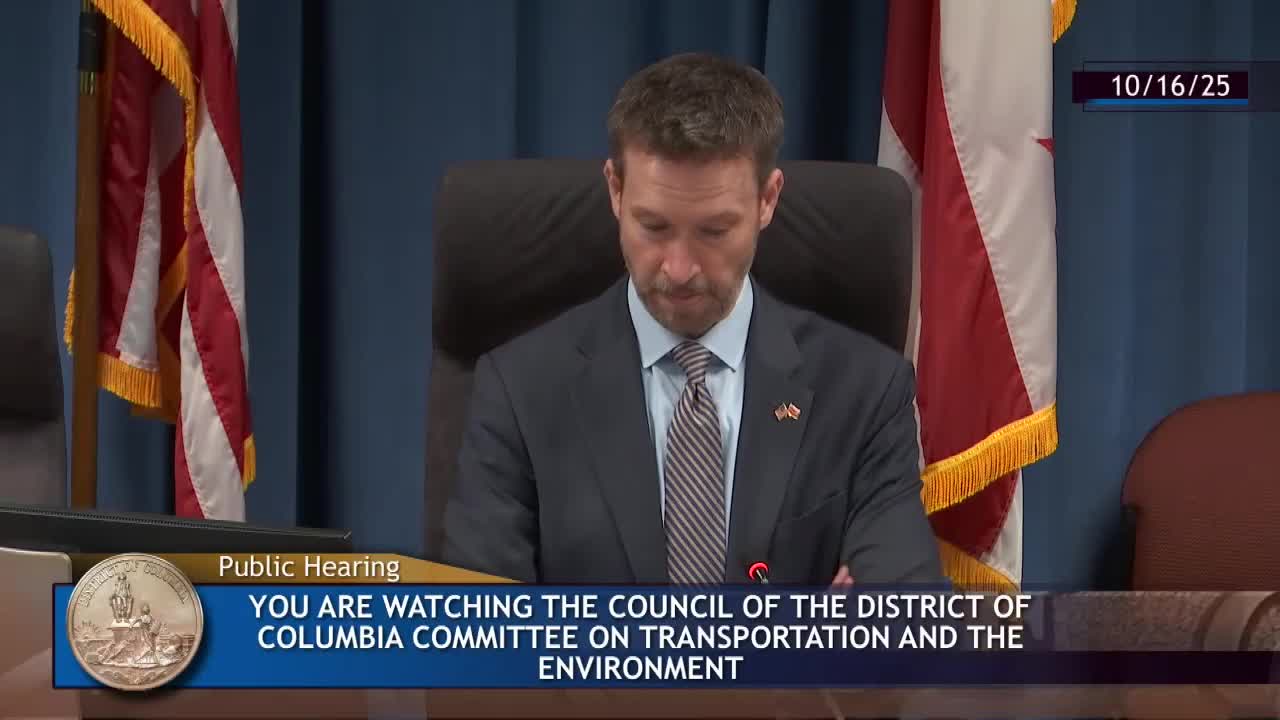Council hearing backs third‑party certification for e‑mobility batteries, debates lab accreditation language

Summary
At an Oct. 16 public hearing of the Council's Committee on Transportation and the Environment, witnesses including safety experts and industry representatives supported the Micro‑Mobility Fire Safety Standards Act of 2025 but debated whether the law should require both OSHA‑recognized NRTLs and ISO/IEC 17065 accreditation for certifiers.
Councilmember Charles Allen, chair of the Committee on Transportation and the Environment, opened an Oct. 16 hearing on three mobility bills by saying the committee would consider safety rules for micro‑mobility devices and batteries. The Micro‑Mobility Fire Safety Standards Act of 2025 would require devices sold, leased or rented in the District to be certified by a third‑party certification body to meet national safety standards.
The bill, introduced on May 6, cites three American national UL standards: UL 2849 (electric bicycles and e‑mobility systems), UL 2272 (personal e‑mobility device electrical systems) and UL 2271 (batteries for light electric vehicle applications). Chair Allen said the measure would require a certification body that is both recognized by OSHA as a nationally recognized testing laboratory (NRTL) and accredited to ISO/IEC 17065.
Why it matters: witnesses and agency staff told the committee the bill targets a real safety risk. Jeff Marudian, president and CEO of UL Standards and Engagement, told the committee that lithium‑ion battery incidents — called ‘‘thermal runaway’’ in industry testimony — can lead to violent venting, fast‑moving fires and toxic smoke that pose acute risks in dense housing. ‘‘The Micro Mobility Fire Safety Standards Act of 2025 is a big step toward improving safety for everyone,’’ Marudian said.
Public witness Chuck Ludlam, who identified himself as living in a Cathedral Heights cooperative, urged the committee to add a storage‑container requirement for building storage and charging, citing a new UL storage standard released in 2025 and arguing containment cabinets would reduce risk in high‑rise buildings. ‘‘An e‑bike battery fire is actually a series of violent explosions with shrapnel and toxic gases,’’ Ludlam told the committee.
UL Solutions' government affairs lead Megan Housewright, describing the difference between testing and certification, said certification by a competent, impartial certifier helps enforcement and ongoing compliance because it includes factory surveillance and documentation beyond a single test sample. She supported requiring NRTL certification to the enumerated UL standards.
DDOT Director Sharon Kirschbaum said DDOT already requires certification for permitted shared‑fleet devices and for battery storage in its own programs. ‘‘All DDOT permitted shared fleet devices are already tested and certified to UL 2849, UL 2272, and UL 2271 and meet the testing and certification requirements the bill establishes,’’ Kirschbaum said. DDOT recommended two modest changes: allow ISO/IEC 17065 accreditation as an alternative to an OSHA‑recognized NRTL and permit operators to provide certification documentation to DDOT in lieu of requiring a visible physical mark on each device.
Points of contention: the hearing focused on what to require of certifiers. UL witnesses argued NRTL recognition plus ISO/IEC 17065 are complementary; DDOT and other testimony said many jurisdictions accept either NRTL recognition or ISO/IEC 17065 and that requiring both could be redundant and burdensome. Public testimony also highlighted battery storage, building‑level risk and insurance enforcement as practical levers beyond device certification.
What happens next: the committee accepted public and written testimony through Oct. 30. DDOT said it will continue working with the Council on technical edits; no vote was recorded at the hearing.
Ending note: testimony tied the bill to recent local incidents cited by witnesses: Chair Allen referenced a February 2024 scooter battery fire in an apartment that he said killed one resident and displaced 23; UL presenters and other witnesses cited additional local displacements and national examples to explain the impetus for stricter device certification.

